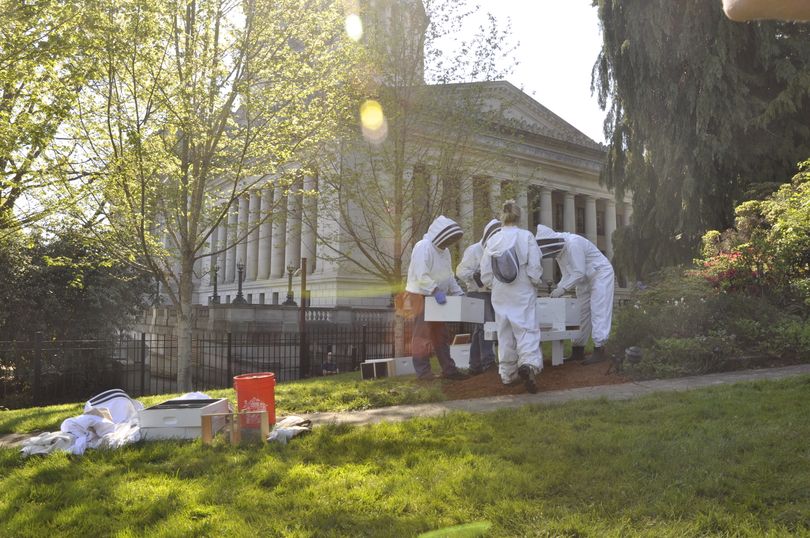Honeybees take up residence at governor’s mansion

OLYMPIA – Two swarms of honeybees got new homes and a new job Wednesday as they moved into hives on the lawn of the governor’s mansion.
Until about 1 a.m. Tuesday, they’d been busy as – well, you know – pollinating the almond orchards of central California. By 10 a.m. Wednesday they’d been moved about 900 miles north and ensconced on the Capitol campus, where they’ll serve two functions: Pollinating gardens and other plants around the campus and helping teach the public about the plight of their sisters around the country.
Honeybees are, after almost entirely female.
“Having them here is a marvelous way to raise public awareness,” Laurie Pyne of the Olympia Beekeepers Association said. Local hives have been hard hit in recent years by a loss of habitat and green space, and by an increase in pesticides, and saw losses of up to 40 percent a year ago, she said.
A rapid decline in bee populations is a serious problem around the country, and has implications for crops and other plants that rely on them for pollination.
“The food we have on our table every day is dependent on having honeybees and other wild bees,” Pyne said.
While it wouldn’t be quite accurate to say the entire campus was abuzz with the honeybees’ arrival, the process of lowering them into new homes was watched by several television cameras, about a dozen journalists and a handful of tourists strolling by on a warm spring day.
The two swarms contain 25,000 bees, or maybe more, Pyne said. It’s a bit hard to get an accurate head count in a swarm. But they are two distinct colonies with separate queens. They’ll forage for pollen over an area of three to five miles from the hives on the mansion lawn, which is just west of the domed Legislative Building. They should find plenty to eat in the warmer months in the flower and vegetable gardens around the campus.
They’d been in the almond orchards this spring to pollinate that crop, but with that chore finished the beekeepers of central California had some hives that had been split and these were surplus. They were shipped up to Olympia and arrived early Wednesday morning.
They’ll adapt quickly to the new location, Pyne said, because they locate their hives not by sight but by the smell of the queen’s pheromones.
The queen of one swarm got an official greeting from First Lady Trudi Inslee, who had a version of “Flight of the Bumble Bee” playing on her cellphone for the occasion. That queen was dubbed “Bonnie Bee” and the governor’s office will solicit names for the second queen on Facebook.
The new hives shouldn’t pose any greater risk to tourists or “than just walking down the street,” Pyne said.
Honeybees aren’t aggressive with a few exceptions. They will sting to protect themselves or their hives, which shouldn’t be a problem for most people on campus because these hives are visible from the sidewalk but behind the fence to the mansion, where access is restricted.
They don’t like to be swatted at, and can sting then. And they don’t like carbon dioxide, so it’s a bad idea to blow on one in an effort to move it, beekeeper Mark Emerich said.
Most people get stung by hornets, wasps or yellow jackets, who forage for protein, not pollen. And they can sting multiple times, compared to honeybees who lose their stinger and die after they sting.
The colonies are likely to need all the honey they produce for the next year, but the governor’s mansion should be able to harvest some honey next year. Trudi Inslee said they’ll probably donate most of the honey collected to the local Food Bank, but the mansion may use some for cooking, much the way the Fairmont Olympic Hotel in downtown Seattle uses honey from the hives on its roof for recipes in its restaurants.
